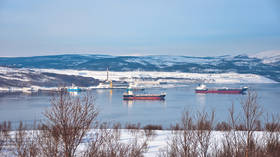Putin opens longest Trans-Siberian tunnel
The 927-meter-long double-track passage is expected to help increase the volume of goods transported to and from Far Eastern markets
The longest tunnel along the Trans-Siberian railway was opened in a ceremony that Russian President Vladimir Putin took part in via video link on Friday. The passage, which is called the Kerak Tunnel, spans 927 meters and is in Amur Region.
Putin has announced that Russia will see numerous major infrastructure projects undertaken in the coming decade, particularly in railroad transport.
“To switch from the 1911 tunnel to a modern facility – that means a lot to us in general, a for today’s situation, in particular,” Putin noted, referring to the fact that the existing passage was declared no longer operational back in 2010 due to its poor condition. Experts concluded that it would make more sense to build a new tunnel than try to repair the original one.
The double-track tunnel was completed almost a year ahead of schedule, Omur Region Governor Vasily Orlov noted. The iconic Trans-Siberian railway spans 9,289km (5,772 miles), running from Moscow all the way to Vladivostok.
The new tunnel is expected to increase the average train speed along the railway and also boost this particular stretch’s capacity – from 120 million to 131 million tons per year. This should translate into larger volumes of goods being transported to and from Asian-Pacific markets.
Speaking at the event, which was part of the Fourth Railroad Convention in Moscow, Putin proclaimed that the “upcoming decade will become a decade of major construction [works], big projects, including in the field of railroad transport.” This will include the modernization of the Trans-Siberian railway, as well as the creation of new Arctic and Pacific lines, with the aim of developing a “globally competitive transport services market” and building a continent-wide transport corridor.
The president expressed hope that these projects would give an economic boost to numerous Russian regions, adding that Moscow has been actively cooperating with Beijing and New Delhi in the area of infrastructure.
While Russia had been expanding its economic ties with Asian nations in recent years, the process has accelerated since the EU and US imposed sanctions on Moscow and reduced trade relations to a minimum over the Ukraine conflict. Russia’s Federal Customs Service has estimated that trade with Asia accounted for around 70% of the country’s total trade turnover between January and September 2023.
You can share this story on social media:








Comments are closed.